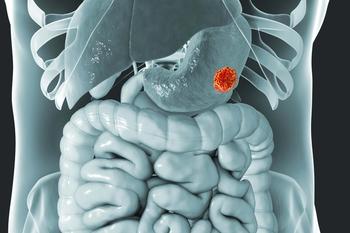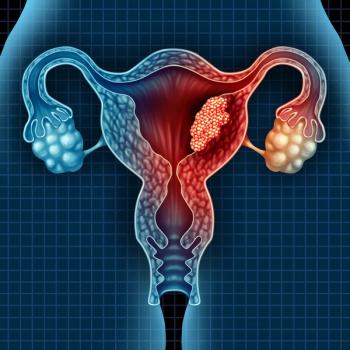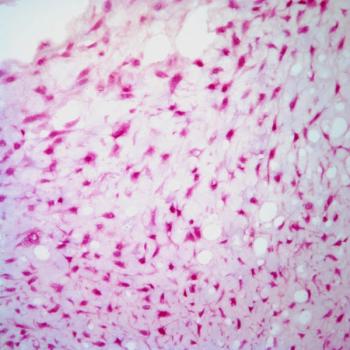
Data from the SEQUOIA trial support the use of zanubrutinib/venetoclax in CLL or SLL regardless of del(17p)/TP53 mutation or IGHV mutational status.

Your AI-Trained Oncology Knowledge Connection!


Data from the SEQUOIA trial support the use of zanubrutinib/venetoclax in CLL or SLL regardless of del(17p)/TP53 mutation or IGHV mutational status.

Results from a phase 2 trial showed an ORR of 62.5% in patients receiving lisaftoclax monotherapy for CLL/SLL.

Findings from the DeFianCe trial support further development of sirexatamab in DKK1-high previously treated metastatic colorectal cancer.

At 8 years follow-up, patients with recurrent prostate cancer in the enzalutamide/leuprolide arm had an OS rate of 78.9% vs 69.5% vs leuprolide alone.

Using multiparametric MRI for initial staging, then cystoscopic biopsy, improves bladder cancer-specific survival compared with transurethral resection of bladder tumor staging.

The combination of olaparib and radium-223 improved rPFS in castration-resistant prostate cancer without prior docetaxel treatment or with fewer than 20 bone metastases.

Disitamab vedotin, toripalimab, and trastuzumab demonstrated superior response rates and efficacy in HER2-overexpressing metastatic gastric cancers.

Results from the ATOMIC trial found a 50% reduction in the risk of death for patients with dMMR colon cancer receiving atezolizumab/chemotherapy.

Nogapendekin alfa inbakicept plus BCG led to a CR rate of 71%, with 60% of responders maintaining their response for at least 12 months, in patients with bladder carcinoma in situ.

Data show no significant differences in pCR rates across treatment arms in the phase 2 FASCINATE-N trial.

Pirtobrutinib sustained BTK inhibition and improved progression-free survival in patients with CLL and SLL, data from the phase 3 BRUIN CLL-321 trial showed.

Administering CAR T-cell therapy in an outpatient setting to patients with relapsed/refractory non-Hodgkin lymphoma was deemed feasible and safe.

Most treatment-related adverse effects reported with CAN-2409 plus valacyclovir in a phase 2 trial were grade 1 or 2.

A phase 2 trial showed favorable antitumor activity when tislelizumab plus chemotherapy was used for patients with locally advaned cervical cancer.

Adjuvant chemotherapy does not yield an improvement in ctDNA clearance compared with observation among patients with stage II colon cancer in the phase 2/3 COBRA trial.

Patients with NPM1-mutated acute monocytic leukemia who are minimal residual disease negative do not appear to benefit from allogeneic stem cell transplant after chemotherapy induction, even with a FLT3 ITD co-mutation.

Quality of life also appears to be maintained with elacestrant in estrogen receptor–positive or HER2-negative ESR1-mutated breast cancer in the phase 3 EMERALD trial.

Data from the phase 3 RUBY trial may support the use of dostarlimab plus chemotherapy as a new standard of care in patients with newly diagnosed primary advanced or recurrent endometrial carcinoma.

Investigators of a phase 1a trial report high objective response rates in patients receiving forimtamig for relapsed/refractory multiple myeloma, including those with high-risk cytogenetics and extra medullary disease.

It may be an optimal approach to improve first-line treatment options to prevent relapse in those with T-cell acute lymphoblastic leukemia, according to Kristen O’Dwyer, MD.

Most adverse effects in a phase 2 trial related to doxorubicin appear to be expected in the treatment of patients with soft tissue sarcoma.

A phase 1 trial continued to show positive responses when PHE885 was used in patients with relapsed/refractory multiple myeloma.

Pembrolizumab plus chemotherapy followed by maintenance pembrolizumab reduced the risk of death or disease progression in patients with mismatch repair proficient or deficient advanced endometrial cancer.

Findings from the phase 3 SUNLIGHT study highlight favorable overall survival and disease control rates with the use of bevacizumab plus trifluridine and tipiracil in metastatic colorectal cancer.

Findings from the final analysis phase 3 SINTRA-REV trial indicated that lenalidomide lowered the risk of transfusion dependency when administered at a low dose in patients with myelodysplastic syndrome.

ARV-471 monetherapy showed clinical benefit in an expansion cohort of patients with locally advanced or metastatic breast cancer, according to data from the VERITAC trial.

Investigators believe that disease modifying agents may demonstrate benefit in patients with myeloproliferative neoplasms prior to allogeneic hematopoietic cell transplant.

Patients with RET fusion–positive solid tumors continued to experience benefit from treatment with selpercatinib, according to extended follow-up from the phase 1/2 LIBRETTO-001 basket study.

Results from the phase 3 KEYNOTE-826 trial show a significant survival benefit with pembrolizumab plus chemotherapy with or without bevacizumab in most patient subgroups with persistent, recurrent, or metastatic cervical cancer.

Data on next line of therapy from the phase 3 Study 309/KEYNOTE-775 trial emphasized the benefit of lenvatinib plus pembrolizumab for advanced endometrial cancer.

Published: September 9th 2021 | Updated:

Published: December 10th 2020 | Updated:

Published: December 8th 2023 | Updated:

Published: June 8th 2021 | Updated:

Published: May 22nd 2022 | Updated:

Published: January 22nd 2022 | Updated: